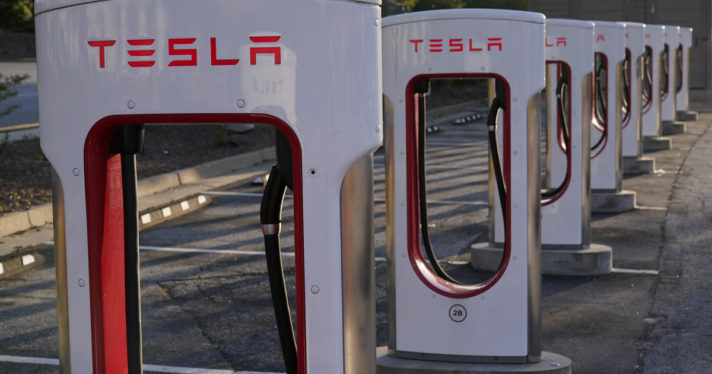The Biden administration has unveiled new initiatives in its $7.5 billion plan to install 500,000 EV chargers on US roads by 2030. As part of that, it announced that Tesla has committed to to open up 7,500 of its charging stations to non-Tesla vehicles by the end of 2024.
In 2021 Tesla announced that its open-access Supercharger program (currently being piloted in 16 European nations) would be coming to the US. With a firm date now in hand, the White House has revealed details of the plan. Of 7,500 chargers available for all compatible EVs, 3,500 will be new and existing 250 kW Superchargers along highway corridors. The rest will be Level 2 Destination Charging stations (22 kW max) at hotels, restaurants and other urban and rural locations. Tesla will also boost its US Supercharger network by 300 percent, officials said.
Select Tesla Superchargers across the US will soon be open to all EVs
— Tesla Charging (@TeslaCharging) February 15, 2023
In order to tap into the $7.5 billion in funding, companies must adopt the Combined Charging System (CCS) that dominates in the US, while offering smartphone-friendly payment options. "No matter what EV you drive, we want to make sure that you will be able to plug in, know the price you're going to be paying and charge up in a predictable, user-friendly experience," Transportation Secretary Pete Buttigieg told reporters. Tesla currently uses proprietary chargers, but has committed to adding the CCS standard as well.
To hit its charger goal, the administration has received commitments from EV manufacturers like GM and Ford, along with ChargePoint and other EV charger manufacturers. Those will add more than 100,000 public chargers available to all EVs.
For example, GM has already committed to install up to 40,000 Level 2 stations across the US and Canada as part of its Ultium Charge 360 network. It will also install a coast-to-coast network of 2,000 350 kW fast chargers along US roads in partnership with Pilot Company and EVgo. Ford, meanwhile, plans to install DC fast chargers at 1,920 dealerships by January 2024. Hertz also plans to install thousands of BP's Pulse chargers in US cities for Hertz customers and the public.
Early last year, the White House revealed its charging plan as part of the $7.5 billion National Electric Vehicle Infrastructure (NEVI) Formula Program. That's motivated by an overall plan to convert half of all new US vehicle sales to zero-emissions by 2030. There are now over 130,000 public chargers serving over three million EVs now on the road — still not nearly enough, critics have said. The first tranche of NEVI funds will be delivered to states in the coming weeks.

